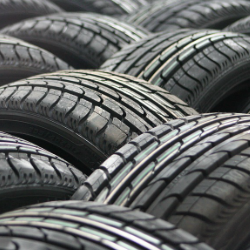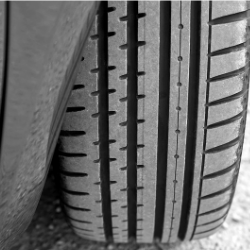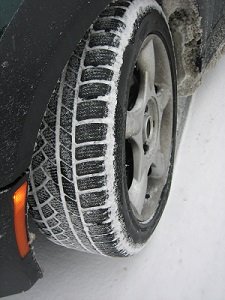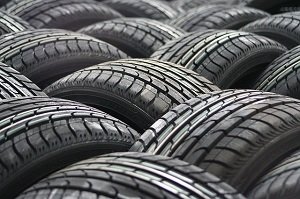Posted on 10/5/2017

In many parts of the US and Canada, it is common to have two sets of wheels and tires to tackle seasonal differences in driving conditions. You know what to do with them while they are on your car, but what is the proper way to store the ones you put up for the season? Here are some tips to ensure your seasonal tires are ready to go when it is time to swap them out. 1. Clean Your Wheels - Contaminants and road grime can degrade the finish on your wheels while they are in storage. Before you put them away, clean your wheels with some mild detergent. Rinse them off and make sure they are completely dry before you put them away for the season. 2. Clean and Treat Your Tires - Tires are made of natural and synthetic rubbers and can dry out while in storage, causing dry rot and cracking which will have you looking for new tires too soon. Before putting them away, clean your tires with a liquid or foaming tire cleaner and wipe off any residue. Then apply a silicon-based spray, c ... read more
Posted on 7/6/2017

Head into the showroom at any tire retailer and you will find a dizzying array of tire types, sizes, tread patterns and other variables that can have you turning right back around and heading the other way. The good news is a step-by-step approach to choosing the right tires for your car, truck or SUV with a little knowledge can make the process much simpler and give you great results. The type of tire you need depends on what kind of vehicle you have, your driving style and the type of weather you must cope with in your area. All Season Tires - Sometimes called Touring Tires, All Season Tires deliver good performance, handling and ride quality on dry, wet and moderately snowy roads. This is the most popular tire type and can be found on most four door sedans, wagons, small SUVs and sporty coupes. Choose All Season Tires for the most well rounded on-road performance. Truck Tires - As the name suggests, these tires are typically found on trucks and large SUVs. Truck tires ... read more
Posted on 1/14/2016

Some people love winter. They love the snow, the snap in the air, the short days and cozy nights at home. Others can’t stand it, for many of the same reasons. Regardless of whether you love it or hate it, though, chances are you’re going to have to get out and drive in it at some point. We’ve got a few suggestions to help you through the winter safely: • Make sure you’ve got a well-maintained car. This includes fresh windshield wipers, proper tire inflation, a strong battery, a properly-maintained cooling system and a fresh oil change. If your tires aren’t up to the job of winter driving, you might consider switching to winter tires for a while – just remember to switch back when temperatures get above 40 degrees. The softer tread compound of winter tires will wear quickly in warmer temperatures. • Make sure your car is thoroughly de-iced before you go anywhere. Hot water might seem tempting because it’s quicker ... read more
Posted on 12/31/2015

In a lot of parts of the country, the winters are tough enough that all-season tires just won’t get the job done. All-season tires are a compromise; they offer good year-round traction with a quiet ride, good handling and road manners. They tend to perform well in wet weather and light wintry conditions, but when the snow is more than a couple of inches deep, all-season tires are out of their league. That’s when it’s time to consider winter tires. Today’s winter tires are a long way from the heavy, noisy, clumsy “snow tires” or “mud grips” that your dad might have had on his station wagon 40 years ago. Modern winter tires are designed for noise, handling, steering response and road manners that rival grand touring tires, only with enhanced traction. They accomplish that with deeper, more aggressive tread grooves and a tread pattern that’s designed to eject snow and slush for a clean “bite” with every revolut ... read more
Posted on 11/12/2015

Winter tires versus all-season tires…which is the right choice for you? The two designs are quite different and deliver different levels of performance and winter-weather traction, so let’s discuss. • All-season tires are designed as an all-around compromise. They feature a tread pattern that evacuates water from the tire’s contact patch to prevent hydroplaning, with plenty of small, textured slits (sipes) to add extra biting edges for traction in wet or slushy conditions. • All-season tires are designed with a harder tread compound that can deliver a long service life and long wear. • All-season tires can deliver the same sort of low noise, comfortable ride and good handling as most touring or grand-touring tires. They offer straight-line stability, good road manners and good road feel on asphalt. Now, let’s compare-and-contrast all-season tires with winter tires… • Winter tires use a softer tre ... read more